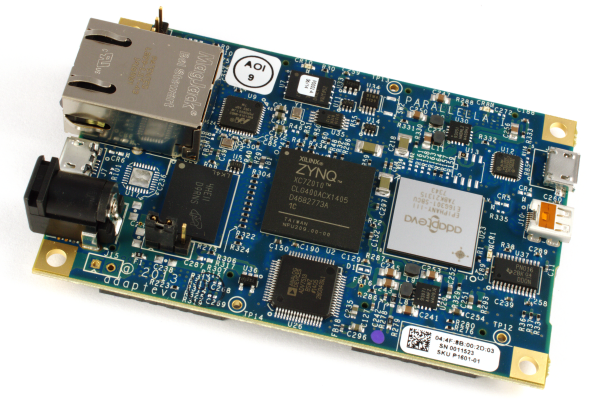The latest version of ePython makes it possible to take existing Python code and offload specific functions (we tend to call them kernels) to the Epiphany cores. This is really viewing the Epiphany as an accelerator, where codes run on the host (the Parallella) and specific computationally intensive kernels are then offloaded to the accelerator for execution. The good news…
Category Archives: Parallella Blog
For an update regarding Adapteva and how it relates to Parallella, please see Andreas’ latest blog post.
A newly developed compiler [0] and paper describing the parallel language [1] are released today which enable a novel approach to parallel and distributed programming for the many-core Epiphany coprocessor included in Parallella as well as multi-core CPUs and distributed clusters. The LOLCODE language, originally developed in 2007, has been extended to include parallel and distributed programming concepts directly within…
Splitting problems up into tasks and running these concurrently over a number of cores is a popular approach to parallelism. In recent years this has becoming more and more popular and is seen as one of the ways in which parallel codes might be written for future machines with very large numbers of processing cores. In this tutorial we are…
In the previous tutorial (available here) we looked at splitting a problem up geometrically. Driven by the decomposition of the data, different parts of the problem ran on different Epiphany cores with these cores often needing to communuicate when a neighbouring value held on another core was required. Whilst geometric decomposition is a very common approach not all problems are…
In the previous tutorial (here) we concentrated on different ways to pass messages between cores which is one of the core mechanisms of parallelism. We saw that messages can be point to point, where only two cores are involved, or collective where every core is involved. The forms of communication that you select depends upon the problem you are trying…
This is the first of a number of tutorials where we are going to explore the parallel capabilities of the Epiphany and develop some parallel codes which illustrate the techniques used by HPC programmers to write large scale parallel codes on modern supercomputers. In this post we will concentrate on the mechanisms of parallelism, and one fundamental activity is the…
[UPDATE 3/8/2016 We were not accepted into GSOC, but the Fossi Foundation has graciously agreed to take us under their wings. We will be accepting applications for the RISC-V and SDR projects] We are applying to 2016 Google Summer of Code as a mentoring organization. Below you will find a list of initial project ideas. If you are interested in…
I am happy to tell you that we now have a neat little case for the Parallella board thanks to the outstanding work of Alex Paloranta! In the past the task of properly cooling the board was left up to the user. For some of you this was fine, but for many of you this was a showstopper. The goal…
[UPDATE 3/11/16: The conference has been postponed due to a lack of paper submissions. Perhaps this was to be expected as 90% of Parallella related research has been conducted outside the US and traveling on short notice is always a challenge. More news to follow] Last year we held a successful inaugural Parallella Technical Conference in Tokyo. I am happy to…

